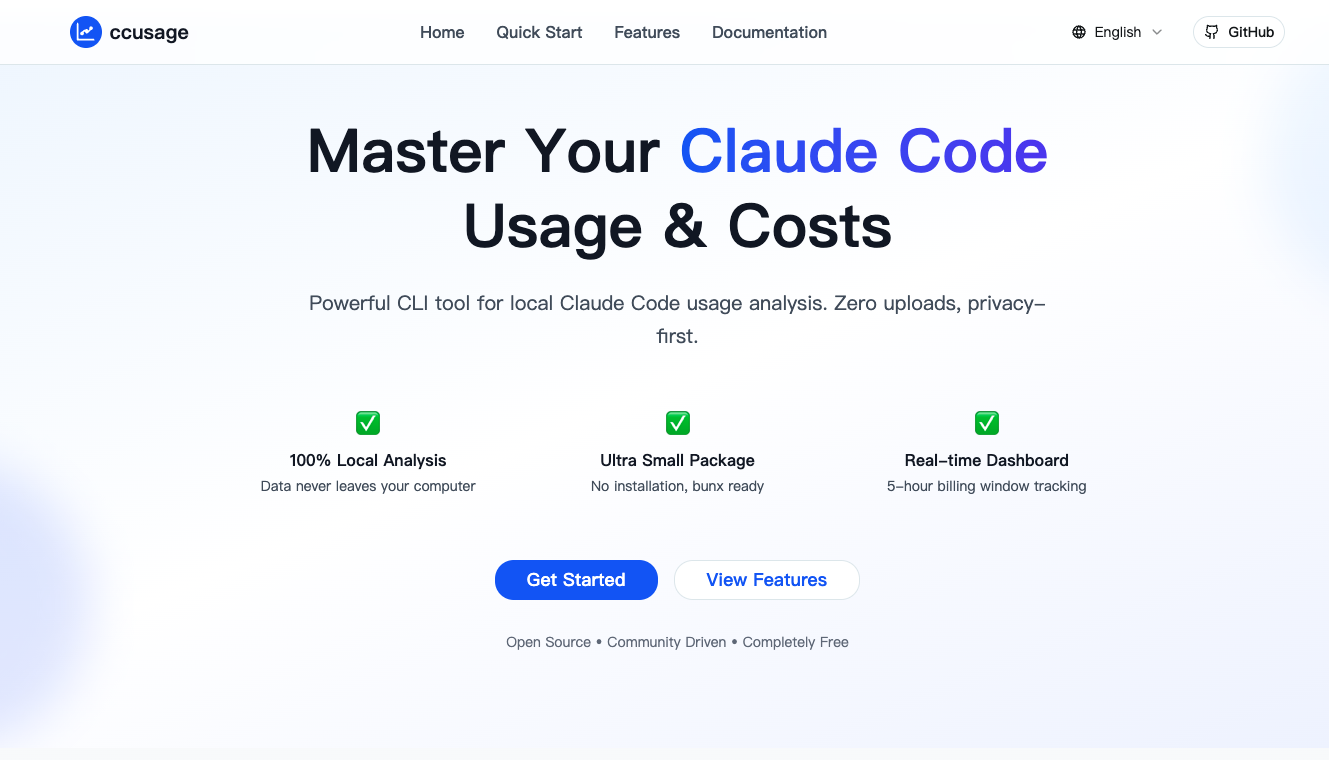Product Introduction
- ccusage is a command-line interface (CLI) tool designed to analyze token usage and associated costs for Claude Code interactions. It operates entirely locally without requiring data uploads, ensuring privacy while providing detailed cost breakdowns and usage patterns. The tool supports both subscription-based and pay-per-use billing models across all Claude models including Opus, Sonnet, and Haiku.
- The core value lies in enabling precise monitoring of AI resource consumption through automated reporting and real-time tracking. It helps developers optimize Claude Code usage by identifying cost-intensive patterns while maintaining strict data privacy through local processing. The tool's 5-hour billing window alignment ensures accurate cost calculations matching Claude's official billing cycles.
Main Features
- The tool performs 100% local analysis by processing Claude usage data directly on the user's device without internet connectivity after initial setup. This includes parsing API logs and interaction histories while using cached pricing data for offline cost calculations. All token consumption metrics remain confined to the local environment.
- Real-time monitoring capabilities display active sessions through an interactive dashboard that updates every second. Users can track token burn rates, projected costs, and remaining time in Claude's 5-hour billing windows via the
ccusage blocks --livecommand. The dashboard shows model-specific usage and cost projections with color-coded status indicators. - Comprehensive reporting generates daily, monthly, and session-based analyses through commands like
ccusage daily. Reports include detailed breakdowns of input/output tokens, model-specific costs, and trend visualizations. JSON export functionality enables integration with external analytics pipelines while maintaining data structure integrity.
Problems Solved
- Addresses the challenge of tracking unpredictable Claude Code costs across multiple models and billing cycles. Traditional methods require manual log analysis and lack alignment with Claude's 5-hour billing windows, leading to cost estimation errors.
- Targets developers, AI engineers, and product teams managing Claude-powered applications who require granular usage insights. Particularly valuable for organizations needing to audit AI expenditures or optimize resource allocation across development teams.
- Enables use cases like identifying expensive conversation sessions, comparing model performance costs, and preventing budget overruns through proactive monitoring. Technical writers can analyze content generation costs, while consultants maintain client confidentiality through local data processing.
Unique Advantages
- Differs from cloud-based analytics tools by eliminating data transmission through complete local processing. Unlike browser extensions or SaaS platforms, ccusage doesn't require API keys or sensitive data exposure.
- Implements Claude-specific 5-hour billing window tracking that automatically aligns cost calculations with official Anthropic billing cycles. This provides more accurate projections than generic token counters using simple hourly/daily splits.
- Combines a sub-1MB package size with zero-install execution via
bunx ccusage, contrasting with typical Node.js tools requiring 10MB+ dependencies. The tool maintains updated pricing data through periodic LiteLLM synchronization while allowing full offline operation.
Frequently Asked Questions (FAQ)
- How does ccusage ensure data privacy? All analysis occurs locally on the user's machine without transmitting usage data to external servers. The tool processes Claude API logs and interaction histories directly from the file system using read-only access.
- What installation methods are supported? Users can execute ccusage without installation via
bunx ccusageor install it globally usingnpm install -g ccusage. The Bun runtime enables instant execution while maintaining compatibility with Node.js environments. - How does 5-hour billing window tracking work? ccusage segments usage data into rolling 5-hour intervals matching Claude's billing cycles, calculating costs based on the exact window when tokens were consumed rather than calendar days. This prevents cost estimation errors from partial window usage.
